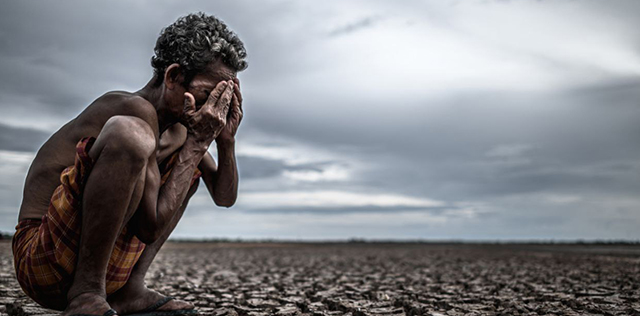The Impact of Climate Change on India's Agriculture and Food Security
- 23 September, 2024

Climate change is a pressing global crisis with profound effects on food production and nutrition. Among the countries most vulnerable to these impacts, India, a major player in agriculture, faces severe threats due to climate change.
With a large population depending on agriculture for both sustenance and livelihood, the decline in crop yields and nutritional quality poses serious risks to food security and public health.
How Climate Change Impacts Indian Agriculture
India’s agricultural landscape is undergoing significant changes, driven by:
- Erratic Weather Patterns: Increasingly irregular rainfall, prolonged droughts and intense flooding disrupt traditional crop cycles, damaging crops and reducing yields.
- Rising Temperatures: Higher temperatures result in heat stress, which affects crop growth, reduces pollination and shortens growth cycles.
- Water Scarcity: Altered rainfall and increased evaporation rates lead to water scarcity, challenging irrigation efforts and impacting crop productivity.
- Altered Pest Dynamics: Changes in temperature and precipitation support pest proliferation, leading to more crop losses and reduced nutritional value.
The Challenges of Erratic Weather Patterns
Changes in weather patterns lead to unpredictable rainfall and droughts in some areas, while others face heavy rains and flooding. These variations pose challenges as farmers struggle to adapt:
- Disrupted Crop Cycles: Irregular rainfall affects planting and harvesting, reducing yields.
- Extreme Weather Events: Increased frequency of storms, cyclones and floods cause direct damage to crops.
Temperature Rise and Its Adverse Effects on Crops
The increase in temperature due to climate change directly impacts crop development:
- Heat Stress: High temperatures during critical growth stages, like flowering, impair pollination and seed formation.
- Accelerated Growth Cycles: Rapid maturation reduces the yield potential of crops.
- Enhanced Water Stress: Elevated temperatures increase evaporation rates, leading to soil moisture depletion.
Water Stress and Scarcity
Water scarcity is a growing concern due to altered rainfall and higher evaporation rates, challenging irrigation and crop health:
- Limited Irrigation: The scarcity of water affects irrigation, leading to yield loss, poor crop health and reduced nutritional quality.
- Shift in Cropping Patterns: Farmers may opt for water-efficient crops, though these may offer lower nutritional value.
Pest Dynamics and Crop Losses
Climate change impacts pest distribution and growth, leading to:
- Increased Pest Pressure: Higher temperatures create favourable conditions for insect pests, diseases and weeds.
- Nutritional Value Decline: Increased pesticide use due to pest pressure can negatively affect crop health and nutrition.
India’s Role in Mitigating Climate Change
India has committed to reducing its carbon footprint by 2070, aligning with international efforts. On an individual level, we can contribute by:
- Adopting Green Energy: Switching to eco-friendly energy sources for households.
- Optimising Home Conditions: Ensuring optimal thermal, noise and light levels at home to minimise energy use.
- Choosing Eco-Certified Projects: LEED and WELL-certified homes are recommended for those seeking environmentally friendly housing.
Steps Towards Climate-Resilient Agriculture
Addressing climate challenges in agriculture requires a comprehensive approach that includes:
- Climate-Smart Agriculture: Utilising efficient irrigation systems, crop diversification and agroforestry to build resilience.
- Climate-Resilient Crop Varieties: Promoting crops that can withstand adverse conditions like drought or pest resistance.
- Policy Support: Implementing supportive policies that encourage sustainable agricultural practices.
- International Collaboration: Sharing knowledge and innovations to build effective strategies for climate adaptation.
By acknowledging these challenges and proactively adopting adaptive practices, India can protect its agricultural sector, ensure food security and mitigate the adverse effects of climate change on crop yields and nutritional quality.
Tags:
Related Blogs
The Impact of Climate Change on India's Agriculture and Food Security
- 23 September, 2024











